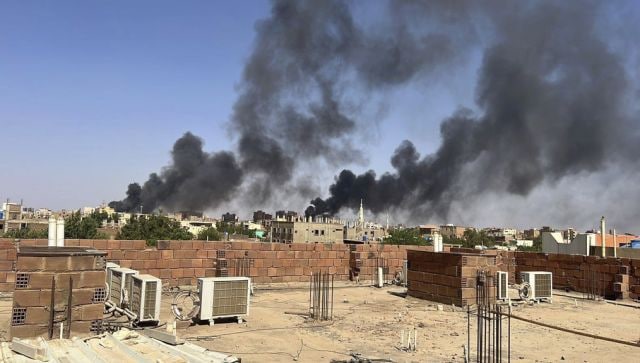
Smoke fills the sky in Khartoum, Sudan, near Doha International Hospital on Friday, 21 April. Maheen S via AP

Smoke fills the sky in Khartoum, Sudan, near Doha International Hospital on Friday, 21 April. Maheen S via AP
The tension in Sudan is escalating as the army and the paramilitary Rapid Support Forces (RSF) wrestle for power. With no end to the violence, foreign nations are speeding up evacuation efforts. Amid this, the World Health Organization (WHO) warned of a “huge biological risk” at a laboratory in Khartoum – the National Public Health Laboratory – caught up in the ongoing conflict.
Sudanese fighters reportedly seized the laboratory. While it was first unclear which of the two sides occupied the building, a report on CNN says it has been taken over by the RSF led by Mohamed Hamdan Dagalo, also known as Hemedti.
What has the WHO said?
Workers at the National Public Health Laboratory can no longer access it. Power cuts were making it impossible to manage material in the facility.
Dr Nima Saeed Abid, the WHO representative in Sudan, expressed concerns that “one of the fighting parties” — he did not identify which one — had seized control of the central public health laboratory in Khartoum and “kicked out all of the technicians”.
“That is extremely, extremely dangerous because we have polio isolates in the lab. We have measles isolates in the lab. We have cholera isolates in the lab,” he told a UN briefing in Geneva by video call from Port Sudan. “There is a huge biological risk associated with the occupation of the central public health lab in Khartoum by one of the fighting parties.”

According to officials, a variety of biological and chemical materials are kept at the lab. Apart from measles and cholera pathogens, it stores other hazardous materials. With a power cut, the chances of blood bags, which are already depleting, getting spoiled have increased, reports the BBC.
The expulsion of technicians and power cuts in Khartoum means “it is not possible to properly manage the biological materials that are stored in the lab for medical purposes,” WHO said.
Also read: The fight between rival generals for the control of the nation, explained
What is in the lab?
Since the lab contains samples of diseases, the risk of a biological hazard is looming large.
A high-ranking medical source told CNN that “the danger lies in the outbreak of any armed confrontation in the laboratory because that will turn the laboratory into a germ bomb.”
“An urgent and rapid international intervention is required to restore electricity and secure the laboratory from any armed confrontation because we are facing a real biological danger,” the source added.

What is a germ bomb?
It is a term used to describe germ weapons or biological weapons.
Bio or germ weapons disseminate disease-causing organisms or toxins to harm or kill humans, animals or plants. They generally consist of two parts – a weaponised agent and a delivery mechanism, according to the European External Action Service.
In addition to strategic or tactical military applications, biological weapons can be used for political assassinations, the infection of livestock or agricultural produce to cause food shortages and economic loss, the creation of environmental catastrophes, and the introduction of widespread illness, fear and mistrust among the public.
Biological and Toxin Weapons Convention, which came into force in 1975, is at the centre of international efforts to prevent disease from being used as weapons.

How dangerous is the lab takeover?
The lab is located in central Khartoum, close to flashpoints of the fighting. A biohazard then puts at risk those stranded in the Sudanese capital.
Thousands have fled the country amid the unrest but many locals continue to stay back. More than 800,000 South Sudanese refugees live in Sudan, a quarter of them in the capital of Khartoum, where they are directly affected by the fighting, according to the United Nations High Commissioner for Refugees. An estimated 24,000 pregnant women are in Khartoum and are expected to give birth in the coming weeks.
At least 459 people have died and 4,072 have been injured in Khartoum, according to the Sudan representative of WHO.
Only a fraction of health facilities in the capital are providing services due to a shortage of staff, medicine and other supplies. As the number of injuries rises, blood is essential to save lives. The stock is already limited and the possibility of it getting spoiled in the lab is not good news.
According to the Federal Ministry of Health in Sudan, 36 per cent of health facilities in Khartoum city are non-functional and another 25 per cent are unresponsive.
“If the violence doesn’t stop, there is a danger that the health system will collapse,” WHO warned.
Amid all this, the threat of a germ bomb only spells doom.
With inputs from agencies
Read all the Latest News, Trending News, Cricket News, Bollywood News,
India News and Entertainment News here. Follow us on Facebook, Twitter and Instagram.